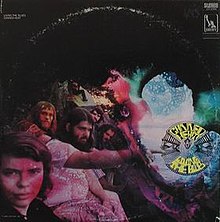
Canned Heat is an American band formed in Los Angeles, California, in 1965. The group is noted for its efforts to promote interest in blues music and its original artists and rock music. It was founded by two blues enthusiasts Alan Wilson and Bob Hite, who took the name from Tommy Johnson's 1928 song "Canned Heat Blues", a song about an alcoholic who had desperately turned to drinking Sterno, generically called "canned heat". After appearances at the Monterey and Woodstock festivals at the end of the 1960s, the band acquired worldwide fame with a lineup of Hite (vocals), Wilson, Henry Vestine and later Harvey Mandel, Larry Taylor (bass), and Adolfo de la Parra (drums).
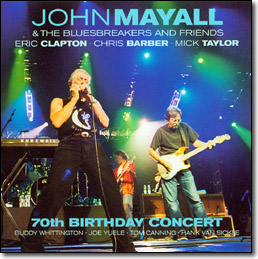
70th Birthday Concert is a live electric blues video recording of John Mayall & the Bluesbreakers to celebrate Mayall's 70th Birthday. Recorded in Liverpool, England on 19 July 2003, the concert was notable as it featured Eric Clapton as a guest, so marked the first time he and Mayall had performed together in almost 40 years, if one discounts Clapton guesting on Mayall's Back to the Roots. The set also features Mick Taylor and Chris Barber.
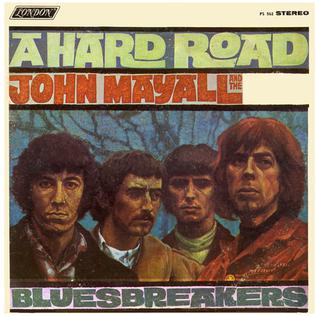
A Hard Road is the third album recorded by John Mayall & the Bluesbreakers, released in 1967. It features Peter Green on lead guitar, John McVie on bass, Aynsley Dunbar on drums and John Almond on saxophone. Tracks 5, 7 and 13 feature the horn section of Alan Skidmore and Ray Warleigh. Peter Green sings lead vocals on "You Don't Love Me" and "The Same Way".
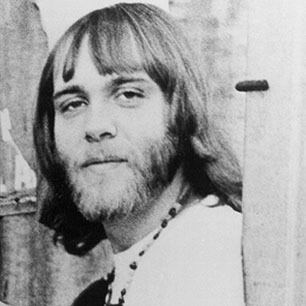
Henry Charles Vestine a.k.a. "The Sunflower", was an American guitar player primarily known as a member of the band Canned Heat. He was with the group from its start in 1966 to July 1969. In later years he played in local bands but occasionally returned to Canned Heat for a few tours and recordings.

Alan Christie Wilson, nicknamed "Blind Owl", was an American musician, best known as the co-founder, leader, co-lead singer, and primary composer of the blues band Canned Heat. He sang and played harmonica and guitar with the group live and on recordings. Wilson was the lead singer for the group's two biggest U.S. hit singles: "On the Road Again" and "Going Up the Country".

"On the Road Again" is a song recorded by the American blues-rock group Canned Heat in 1967. A driving blues-rock boogie, it was adapted from earlier blues songs and includes mid-1960s psychedelic rock elements. Unlike most of Canned Heat's songs from the period which were sung by Bob Hite, second guitarist and harmonica player Alan Wilson provides the distinctive falsetto vocal. "On the Road Again" first appeared on their second album, Boogie with Canned Heat, in January 1968; when an edited version was released as a single in April 1968, "On the Road Again" became Canned Heat's first record chart hit and one of their best-known songs.

Canned Heat is the debut studio album by American blues and rock band Canned Heat, released shortly after their appearance at the 1967 Monterey Pop Festival. The album consists of covers of traditional and popular blues songs.

Boogie with Canned Heat is the second studio album by American blues and rock band Canned Heat. Released in 1968, it contains mostly original material, unlike their debut album. It was the band's most commercially successful album, reaching number 16 in the US and number 5 in the UK.

Future Blues is the fifth album by American blues and rock band Canned Heat, released in 1970. It was the last to feature the band's classic lineup, as Larry Taylor and Harvey Mandel had both departed by July 1970, prior to its release to record with John Mayall and songwriter Alan Wilson died shortly after on September 3, 1970. It was also the only classic-era Canned Heat studio album to feature Mandel, as Henry Vestine had been the lead guitarist on the previous albums. Their cover of "Let's Work Together" by Wilbert Harrison became a hit. "London Blues" features Dr. John. It was re-released on CD in 2002 by MAM productions with five bonus tracks.
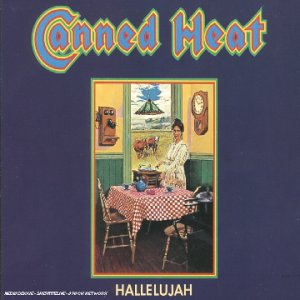
Hallelujah is the fourth album by Canned Heat, released in 1969. It was re-released on CD in 2001 by MAM productions with four bonus tracks. It was the last album to feature classic lineup mark 1, as Vestine left the band prior to Future Blues.

Uncanned! The Best of Canned Heat is a two-disc CD set issued in 1994 that features various tracks from previous albums and some previously unreleased tracks. Highlights include an alternate, longer take of "On the Road Again," and the first release of "Let's Work Together" in stereo.

Robert Ernest Hite was the co-lead vocalist of the American blues and rock band Canned Heat, from 1965 to his death in 1981. His nickname was "The Bear".

Hooker 'n Heat is a double album released by blues musician John Lee Hooker and the band Canned Heat in early 1971. It was the last studio album to feature harmonica player, guitarist and songwriter Alan Wilson, who died in September 1970 from a drug overdose. The photo on the album cover was taken after Wilson's death, but his picture can be seen in a frame on the wall behind John Lee Hooker. Guitarist Henry Vestine was also missing from the photo session. The person standing in front of the window, filling in for Henry, is the band's manager, Skip Taylor. Careful examination of the photo reveals that Henry's face was later added by the art department. Although featured on the cover, vocalist Bob Hite does not sing on the album.

Samuel Lawrence Taylor was an American bass guitarist, best known for his work as a member of Canned Heat from 1967. Before joining Canned Heat he had been a session bassist for The Monkees and Jerry Lee Lewis. He was the younger brother of Mel Taylor, long-time drummer of The Ventures.

Let's Work Together: The Best of Canned Heat is a compilation album by Canned Heat, released in 1989. All of the songs are taken from the first five albums released on Liberty Records between 1966 and 1970, except for "Rockin' with the King", which is from the United Artists Records album Historical Figures and Ancient Heads (1971).

Harvey Mandel is an American guitarist best known as a member of Canned Heat. He also played with Charlie Musselwhite and John Mayall as well as maintaining a solo career.

Vintage is the sixth album by Canned Heat. Produced by Johnny Otis, the album featured the Muddy Waters/Elmore James' song "Rollin' and Tumblin'" recorded with and without Alan Wilson's harmonica leads. These sessions have surfaced on a multiple of reissues including, Don't Forget to Boogie: Vintage Heat (2002), Vintage Canned Heat (1996), Eternal Boogie, Canned Heat in Concert and various other releases.
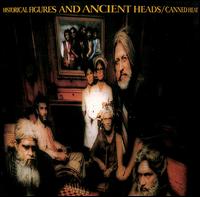
Historical Figures and Ancient Heads is the eighth album by Canned Heat, released in 1971. It was the first album not to feature original member and songwriter Alan Wilson who had died the previous year, and their bassist Larry Taylor, who had left to join John Mayall's band. Featuring new guitarman Joel Scott Hill and Little Richard on "Rockin’ With the King". The record also includes Tony de la Barreda on bass, who left with Hill after this album and subsequent tour.

One More River to Cross is the tenth studio album by Canned Heat, released in 1973. The band negotiated out of their contract with Liberty Records and debuted with Atlantic Records. This album featured horn arrangements played by the Muscle Shoal Horns along with Barry Beckett and Roger Hawkins. The album cover was designed by Ernie Cefalu.
Walter de Paduwa is a Belgian radio DJ, musician and rock'n'roll historian best known for his association with Canned Heat.
